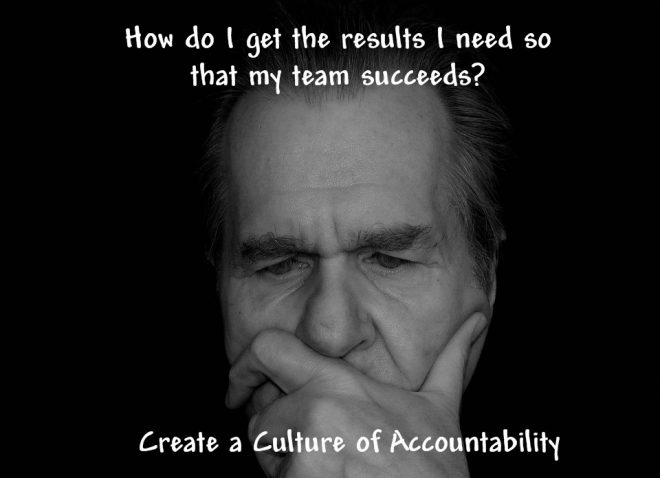The most successful teams are those that get things done on time, correctly and everyone knows what they need to do.
Think of a professional football team that wins the Super Bowl. They may not be the most talented team but they seem to execute everything perfectly. Everything seems to just click for them. What if you could get your team to do the same?
I believe the secret ingredient to a highly successful team is one that has a strong sense of accountability. A culture of accountability. But what exactly is accountability? Is it a team that holds others accountable? No, it is those that hold themselves accountable. In other words, I’m going to hold myself accountable because I have a strong commitment towards my team’s success. I will do what I said I would do in order for us to succeed.
Unfortunately, accountability is often seen as holding others accountable. It becomes punitive and there is a sense of fear attributed to it. That in turn makes matters even worse and creates a culture of nonaccountability. People hide from assignments for fear of retribution.
Creating a positive culture around accountability can give you a competitive edge.
Everyone understands what they need to do so that the team can succeed. Just like the playbook for the football team. Individual assignments are clearly outlined so that the play can be successful if executed correctly.
So, what does accountability really mean? According to Henry Evans, author of Winning with Accountability, accountability is
“Clear commitments that – in the eyes of others – have been kept.”
Can the other person count on me to meet my commitments? Am I reliable in their eyes. If I am, I am a person they can count on. If I am not, it is likely they will no longer look to me for future commitments. I am unreliable.
In the business world, this means you will keep and gain clients if you have a strong culture around accountability, and you will lose clients if you do not. Plain and simple.
Henry lays out a simple plan to make sure you can be successful with accountability. There are four steps he outlines to creating this success:
- Clear expectations – Everyone knows exactly what needs to be done.
- Time Specific – Everyone knows when it needs to be done.
- Ownership – Everyone knows what they have to do. Who owns what.
- Sharing – You and I know what each other has to get done.
While these steps seem simple, they are not easy to execute. What needs to be done in creating the accountability culture is understanding your role in the process. Leaders need to get results, so they need to make sure people understand what is expected of them and most importantly, why. If I know exactly what I need to do, and when to get it done, then I am half way there. If I also know why I am supposed to do this, then I have filled the gap often created in just understanding the first part.
Using the football team analogy, the quarter back calls the play (clear expectations), the players execute their part as outlined in the playbook (ownership), the play is executed in detail (timing) and the play is successful (results). They all perform well because they know if they execute correctly they will win (the why).
Using this same analogy in business, the CEO develops the vision, or where the company needs to go (clear expectations), when it needs to get done by (timing), assigns roles to key staff to execute the plan (ownership) and monitors the progress along the way (sharing). The CEO also works on the why by establishing the culture of accountability. This culture is embedded throughout the organization so that people understand that when they make a commitment they will deliver as expected because that’s what it takes for the company to succeed. If the company succeeds, they succeed.
A team that executes exactly as planned will deliver each and every time in the eyes of their clients.
A culture of accountability is a strong competitive advantage. It becomes infectious within the organization. Everyone wants to win and you begin to see the language change. You will know when you have a culture of accountability when you get called out by anyone in the company if you are not clear on what you want, or when you want it.
So, if you are interested in winning through accountability, you may be onto something here.
Allyn Vaughn

